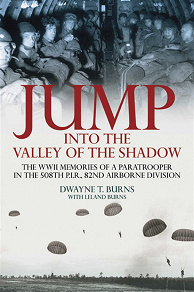
Isbn:
978-19-3514-994-1
Förlag: Casemate
Kategori:
Memoarer & Biografier Historia
Tillgänglig sedan: februari 2021
Förlag: Casemate
Kategori:
Memoarer & Biografier Historia
Tillgänglig sedan: februari 2021
E-bok
Jump: Into the Valley of the Shadow
When Dwayne Burns turned 18 during World War II, he decided that he wanted to fight alongside America’s best. He joined the paratroopers and was assigned to the 508th Regiment of the 82nd Airborne Division. Little did he suspect that a year later he'd be soaring in a flak-riddled C–47 over Normandy, part of the very spearhead of the Allied drive to seize back Europe.
Burns landed behind German lines during the dark, early hours of D–day, and gradually found other survivors of his division. The paratroopers fought on every side in a confused, running battle through the hedgerows, finally making a stand in a surrounded farmhouse. With one room reserved for their growing piles of corpses, the paratroopers held their ground until finally relieved by infantry advancing from the beaches.
After being pulled out of Normandy, the airborne troops were said to be “burning a hole in SHAEF’s pocket,” and thus were launched into Holland as part of Montgomery’s plan to gain a bridgehead across the Rhine. This daytime jump was less confused than the nocturnal one, but there were more Germans than expected and fewer Allied forces in support. It was another maelstrom of pointblank combat in all directions, and though the 82d achieved its objectives, the campaign as a whole achieved little but casualties.
The 82d had hardly refilled with replacements when the Germans broke through the U.S. front in the Ardennes. The 82nd’s paratroopers were put aboard trucks and hastened to stand in the way of the panzer onslaught. Passing through Bastogne they went farther north to St. Vith, where the U.S. 7th Armored and other divisions were reeling. The 82nd held its own with quickly assembled defense perimeters, allowing other units to escape. After beating off massive attacks by German SS, the paratroopers were disgusted to hear that they, too, had been ordered to retreat. They didn’t feel they needed to, but Monty was determined to “tidy up the battlefield.” On January 3 they counterattacked through the freezing hills, sealing off the Bulge and pursuing the Germans back into the Reich.
In this work, Dwayne Burns, assisted by his son Leland (U.S. Army, 1975–79), not only relates the chaos of combat but the intimate thinking of a young soldier thrust into the center of several of history’s greatest battles. His memories provide a fascinating insight into the reality of close-quarters combat.
Burns landed behind German lines during the dark, early hours of D–day, and gradually found other survivors of his division. The paratroopers fought on every side in a confused, running battle through the hedgerows, finally making a stand in a surrounded farmhouse. With one room reserved for their growing piles of corpses, the paratroopers held their ground until finally relieved by infantry advancing from the beaches.
After being pulled out of Normandy, the airborne troops were said to be “burning a hole in SHAEF’s pocket,” and thus were launched into Holland as part of Montgomery’s plan to gain a bridgehead across the Rhine. This daytime jump was less confused than the nocturnal one, but there were more Germans than expected and fewer Allied forces in support. It was another maelstrom of pointblank combat in all directions, and though the 82d achieved its objectives, the campaign as a whole achieved little but casualties.
The 82d had hardly refilled with replacements when the Germans broke through the U.S. front in the Ardennes. The 82nd’s paratroopers were put aboard trucks and hastened to stand in the way of the panzer onslaught. Passing through Bastogne they went farther north to St. Vith, where the U.S. 7th Armored and other divisions were reeling. The 82nd held its own with quickly assembled defense perimeters, allowing other units to escape. After beating off massive attacks by German SS, the paratroopers were disgusted to hear that they, too, had been ordered to retreat. They didn’t feel they needed to, but Monty was determined to “tidy up the battlefield.” On January 3 they counterattacked through the freezing hills, sealing off the Bulge and pursuing the Germans back into the Reich.
In this work, Dwayne Burns, assisted by his son Leland (U.S. Army, 1975–79), not only relates the chaos of combat but the intimate thinking of a young soldier thrust into the center of several of history’s greatest battles. His memories provide a fascinating insight into the reality of close-quarters combat.
Logga in för att låna
Information
Stöds av följande plattformar
PC/Mac
Surfplatta Läsplatta
Smartphone
